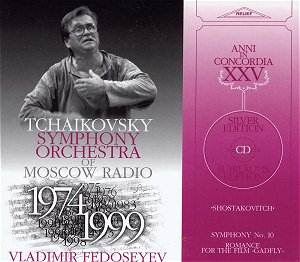Strange to have documentation and performance
so much at odds. A spot of proof-reading would not have gone amiss
(not just mis-spellings, but letters clearly going astray between
keyboard and printing press: ‘Hostakovich’s music’). Not only
that, the biography of Fedoseyev alone is longer than the notes
on the Symphony and the Romance combined!. There is no information
as to the recording venue, either.
The case for the prosecution, then. But listen
to the disc itself and the quality is beyond reasonable doubt.
Fedoseyev’s sense of pulse is near-perfect. There is a lovely
sense of onward movement to the Moderato, without any sense of
rushing. What’s more, Fedoseyev avoids any temptation to bask
in the harmonic arrival points at around two minutes into the
movement (in stark contrast to Ilan Volkov in his recent Prom
performance of this work: August 7th, see review).
The entire performance oozes maturity, rising fearlessly to the
climaxes. To hear a Russian orchestra at full pelt (around twelve
minutes) is to be reminded of the sheer elemental power of this
music. It is like being confronted with a sheer wall of sound
(there is little roughness here, merely imposing power). This
rawness is carried over to the second movement, a whirling dervish
in sound (listen also to the seriously together off-beat accents).
Tremendously exciting.
The third movement (Allegretto), with its horn
motto theme, emerges as initially graceful. Initial statements
of the horn theme bode well: a tasteful use of vibrato is in evidence.
By 4’40, the horn is far too raucous (threatening to go out of
control almost). This is the weak link in Fedoseyev’s armour,
although it is not enough to detract from the magnificence of
his conception. His way with the more fragmentary passages of
the finale is excellent, the DSCH statements (8’50) having real,
potent dramatic force. Commendable, too, is the use of hard sticks
for the timpani strokes at the end, giving the definition this
ending needs.
I still have a soft spot for Karel Ančerl’s
1955 mono recording with the Czech Philharmonic (currently available
on DG The Originals 463 666-2, recorded in the Herkulessaal in
Munich). In sheer advocacy and structural grasp, it takes some
beating.
Relief’s coupling is a bit strange. The Romance
from the Gadfly is one of Shostakovich’s most popular pieces.
Fedoseyev evidently believes in it, and Mikhail Shestakov plays
the solo violin part with great eloquence. But even with this
glowing belief in the music, it seems almost comic after the trials
and tribulations of the Symphony.
Very highly recommended indeed. The Tenth receives
a rendering whose integrity is never once in doubt.
Colin Clarke
